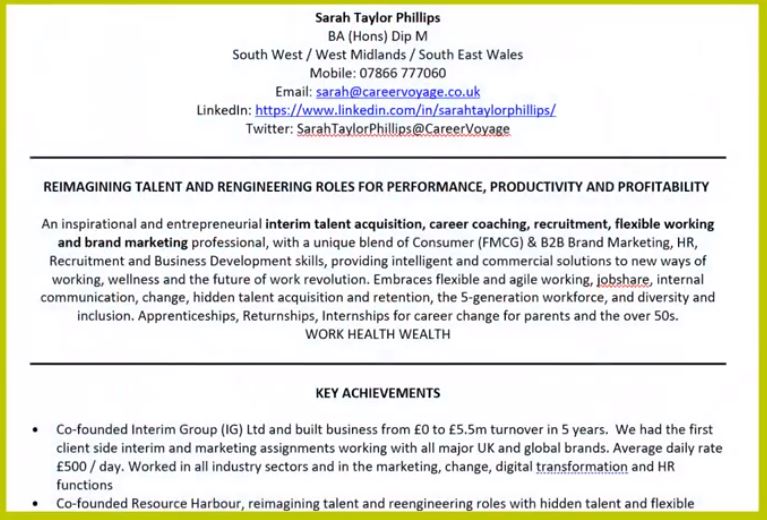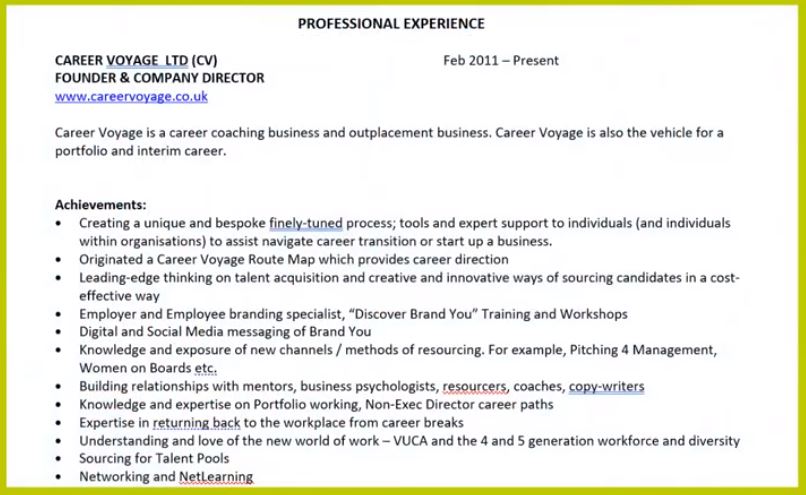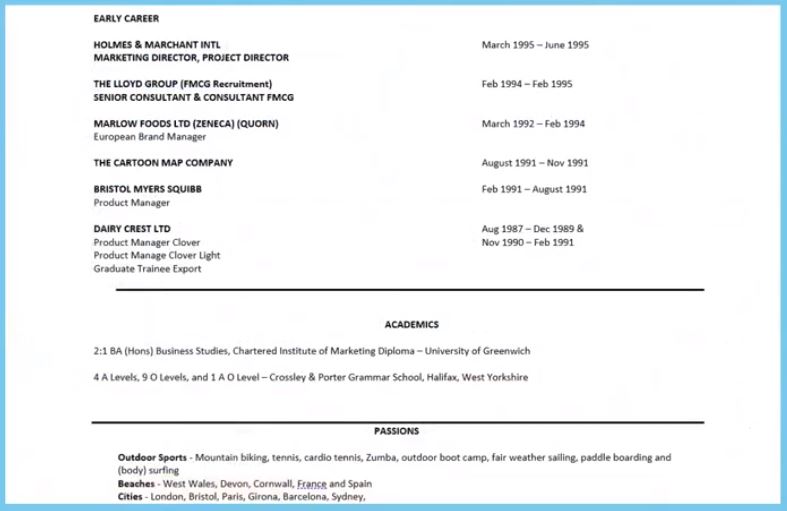We all know what a CV is, but do you really understand just how important it is? Before you start to write your CV, it’s a good idea to remind yourself exactly why you are writing it and where you want it to take you. Just taking a few minutes to do this can really help get you in the right mindset. So grab yourself a cup of tea, take some time for “you”, try to limit distractions, and we’ll take you through all the advice you need to create a CV that gets you in front of your ideal employer.
Before you start to write your CV, you need to know where you want to go. This is a crucial part of creating your CV as you need to be able to research the job role and employers you want to work for and tailor your CV, so it reflects the direction you are heading.
“Would you tell me, please, which way I ought to go from here?
“That depends a good deal on where you want to get to.”
“I don’t much care where…”
“Then it doesn’t matter which way you go.”
This is a great quote by Lewis Carroll, Alice in Wonderland, and is true when completing your CV. If you don’t know where you want your CV to take you, it really doesn’t matter how you write it.
Why is a CV important?
A CV (also known as a Curriculum Vitae) is your personal marketing document. It’s the tool you use to initially market yourself to potential employers and is often the first impression they have of you.
Your CV’s purpose is to secure you an interview with the employer or recruiter and needs to showcase your:
- skills,
- knowledge,
- experience,
- capability,
- and suitability.
This should be done clearly and concisely and tailored to each role you apply for with specific keywords used in the job description and examples of why you are the ideal person for the job. Another important reason to use keywords that are featured in the job description is due to ATS. ATS stands for Applicant Tracking Software, and many recruiters and larger employers use this to assist with screening out unsuitable candidates. The software is programmed to look for keywords that are often found in the job description, and if they do not find enough of these in the CV they are scanning, then the CV is often rejected before it is even looked at by the person hiring. Similarly, employers or recruiters only have a small period of time to screen candidates. Again, they will initially scan the keywords or phrases they require before taking a more in-depth look at the CV. Here are some of the main reasons CV’s are often screened out by either ATS or human screening:
- Typos – Use free software such as Grammarly, it will not only check for spelling but also grammar and conciseness as well
- Length
- Industry
- Location
- Seniority
- Recent experience
- Education
- Unreadable format (google docs, PDF, etc)
What employers want
Whist writing your CV, another great tip is to put yourself in the employer’s place; if you were recruiting for this position what would you want to see on a candidates CV?
- Evidence that the candidate can do the job they are applying for
- To see how a candidate adds value and stands out from others.
- Tailored and bespoke CV’s and Cover Letters showing that a candidate has researched the employer and the role they are applying for
- To easily see how candidates compare to each other.
- To be able to articulate to the manager or lead recruiter why a particular candidate should be invited to interview
Writing your CV
Hopefully, you are now in the right mindset to write your CV. You should have a clear idea of where you want your CV to take you, why it is important and what an employer will be looking for. So let’s move on to actually getting your CV completed.
Content and Structure
Content and structure can be quite a personal thing. You only need to do a quick Google search to see lots of differing advice around how a CV should be structured. If you gave your CV to several different people, you would likely get several different opinions back. The best advice is to make sure the CV you write is a CV that you are happy with that you love and that you think markets you in the best way. The structure we are going to go through today was recommended by a recruiter at IBM and has always had excellent results so try this way and then tweak it if necessary to make it a CV you are delighted with.
- Personal Information – an employer or recruiter needs to be able to contact you so this should be at the very top and centre of your CV
- Headline/Personal Statement – this is a high-level overview of what you can offer an employer and the direction you want to go.
- Key Achievements – how many you use is your choice; however, we recommend two or three per job role, starting with the most relevant to the role you are applying for and ensure they are quantifiable.

This is an example of the first three sections
- Recent Professional Expertise – this should clearly highlight your responsibilities and achievements in your most recent roles.

An example of Professional Expertise / Experience
- Early Career – this does not need to be in so much detail as point 4 and can be a list.
- Academics – add your qualifications and any relevant training you have completed – this could be internal as well as accredited.
- Interests / Achievements – there are several differing opinions around adding your interests to your CV. Some experts will tell you not to, and others will say you should. Of course, the decision is yours however we recommend you do if you have activities out of work that is interesting and shows how you are different from other candidates. Refrain from using interests such as “spending time with family”, “socialising” or “going for walks” etc

And finally the last part of your CV
How long is too long?
The length of a CV is another area that is well debated and again is really about the length of your career and your personal preference. Depending on the length of your career, three pages are typically about right. However, if your CV needs to be four pages long to include all the relevant information an employer needs to choose you for an interview, don’t try to pack it into three pages. It is important to ensure you are using the keywords from the job description, so make sure you give yourself enough space to do this.
Design and Format
This is another essential part of your CV. As mentioned before, if the format of your CV if unreadable to ATS, then it is likely to be rejected. Bear these things in mind when thinking about the design and format of your CV:
- Use Word (not Google Docs or PDF) – Not only is this likely to be rejected by ATS but also if the recruiter or employer can not easily open your CV they are likely to move on to the next
- Plain format – refrain from using colours or fancy fonts, your CV needs to be clear, concise and easily comparable
- No visuals – do not use images such as company logo’s as this will often confuse ATS and also do not include your own photo
- Highlighting – use Bold to highlight company names and job titles, so they stand out
Top tips
Keywords and Skills
Here are just some of the keywords and skills that can be really helpful when writing your achievements and responsibilities and are the types of words employers are looking for

ATS Compatibility
We have mentioned ATS a few times throughout this guide and here are a few more tips to help pass this screening and get your CV in front of a human
- Get a job description – having the job description means you can incorporate the keywords used into your CV and Cover Letter
- jobscan.co – upload the job description and your CV to jobscan.co, this will then review the documents and provide you with where there are gaps
- Review – after finding the gaps in your CV, review them and make the necessary changes
Writing achievements
Some people find it difficult to articulate their own achievements; however, this is the time to really be confident. Here are two examples of describing the same achievement, when writing your own achievements, always try to quantify them like the second example.
Duties included supervision of staff
or
Successfully led a team of six, providing leadership and coaching which resulted in recognition from the MD
Ask others
As we said above, some people find it difficult to talk about their own strengths and achievements so to help you do this ask friends/family/colleagues etc.:
- What do you think my strengths are?
- Where have you seen me make a big difference?
- Where have you seen me at my best?
- What are my areas for improvement?
- What do you think success would look like for me?
You should have a really great CV that will get you in front of your dream employer.
Best of luck
If you enjoy our content, be sure to follow us on social media for all the latest updates

Sarah started her career in fmcg marketing working as a brand manager on Clover and as an interim manager on Clover (twice) and Quorn. She founded a start-up interim management company in Gloucestershire and that business changed the percentage of women and diverse talent in senior marketing and HR roles. Sarah specialises in attracting, onboarding, developing, engaging and retaining diverse talent into forward thinking businesses to improve productivity, performance and profit. Flexible working and wellbeing play a large part. Since covid-19 wreaked havoc on the job landscape, Sarah has a created an innovative programme to get senior experienced professionals back into work or fine-tune their current role so that it makes happy.
